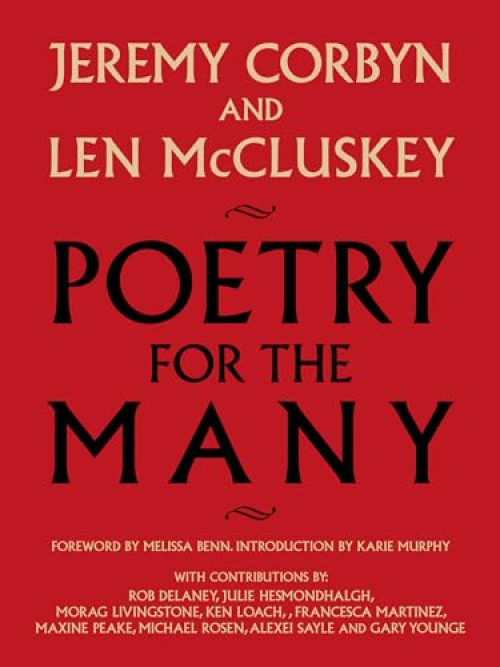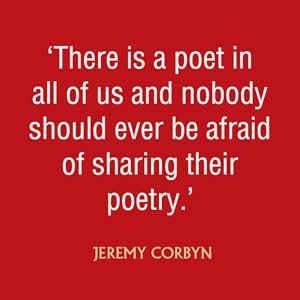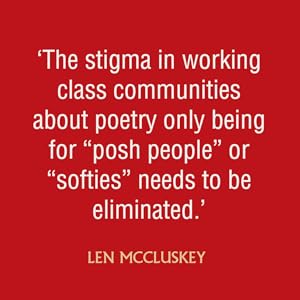Poetry for the Many, an anthology by Jeremy Corbyn and Len McCluskey

Jenny Farrell reviews the new anthology by Jeremy Corbyn and Len McCluskey, OR Books, New York and London, 2023, available here
Poetry for the Many is a truly remarkable publication by two of Britain’s most outstanding socialists, whose public profile does not bring the publication of poetry books immediately to mind.
Jeremy Corbyn and Len McCluskey, former leaders of the Labour Party and Unite the Union respectively, are prominent figures in British politics. They are highly respected not only by the political Left in Britain, but also among working-class communities and all those who support their struggle for genuine democracy around the world.
Both men have a long history of public service, fighting for workers’ rights and social justice. They are proud trade unionists and committed socialists, with a strong internationalist perspective. Their careers have been marked by a steadfast commitment to the values of fairness and justice.

Jeremy Corbyn, the Member of Parliament for Islington North, is known for his tenacity and incorruptibility. As Labour Party leader from 2015 to 2019, he significantly expanded the party’s membership and gave hope to a new generation of politically engaged young people that real change and a better life for all was possible.
Len McCluskey, the former general secretary of Unite, is celebrated for his industrial and political acumen. Under his leadership, Unite became the most influential British union. Growing up in Liverpool, Len was shaped by the city’s vibrant cultural scene and its strong sense of community. His leadership style is known for being both combative and confidence-inspiring, championing workers’ struggles both at home and abroad.
Together, Jeremy and Len represent a powerful force for change, dedicated to the fight for fairness, justice, peace, and a better life for all.
The motto “For the Many” was popularised within the Labour Party during the leadership of Jeremy Corbyn. It featured prominently in the party’s 2017 general election manifesto and became closely associated with Corbyn’s tenure as party leader to encapsulate the party’s commitment to social justice and equality.
The phrase is borrowed from Shelley, specifically from his Masque of Anarchy, where the poet calls on the working people of England to become aware of their strength, when he wrote “Ye are Many, they are Few.” Shelley was enthusiastically embraced by the working class, and his convictions live on to this day. They are expressed in the central beliefs enshrined in the work of Jeremy Corbyn and Len McCluskey.
Poetry for the Many is an extension of this core political stance. The title is a challenge to the establishment, which seeks to forever enforce its hegemony of culture and the arts to represent their interests. Working-class people are frequently made to believe that high culture has nothing to do with them and that they cannot understand it even if they tried. Nothing could be further from the truth, and this is what Jeremy and Len have set out to show.
They have collected here a very fine selection of poetry that has been meaningful to them in their lives and in their struggles. Some of the poems are well known, however Len and Jeremy give their particular take on these. Among such famous poems is, for example, William Blake’s hymn Jerusalem about the fight to establish a humane world in the here and now, which is also the motto whoich inspired the creation of this website, Culture Matters. Len writes: “We must remember that Jerusalem was a call to arms, for all nations and working people, and reclaim the poem of a great radical.” Jeremy comments on another poem we all know, “I Wandered Lonely as a Cloud” that it is a reminder of how being in tune with nature’s beauty is a powerful motivation to do what we can to preserve it. Jeremy writes: “by simply describing daffodils in his famous poem [Wordsworth] conveys a strong message advocating for environmental sustainability.” Both Jeremy and Len do something else that we are not taught at school: they highlight the radical potential of the poets who do make it onto the school curriculum.
As a collection, many of the poems presented focus on resistance, class struggles, colonialism, and oppression. To mention some of these: The US-author Langston Hughes’ The Negro Speaks of Rivers connects the Black experience with the long history of human civilisation. Wilfred Owen’s Dulce et Decorum Est and Isaac Rosenberg’s Dead Man's Dump are among those poems that expose the horrors of war and how the working classes are sacrificed for the interests of the ruling elite. “The Peat Bog Soldiers”, a song of resistance, was written by two Germans, Johann Esser and Wolfgang Langhoff, while prisoners in a Nazi concentration camp, as a direct expression of resistance to fascism, and the fight for freedom. Palestinian poet, Mahmoud Darwish’s In Jerusalem addresses the experience of colonised, occupied Palestine. The selection traces a line from the fourteenth to the twenty-first century.

Many of the poems collected here by Len and Jeremy, however, are less well known and often stem from the canon of writings by the oppressed. They describe the experience of poverty, repression, racial, sexual or religious discrimination, displacement, prison, and wars. It is hardly surprising therefore that we are so much less familiar with them, as they challenge directly establishment cultural hegemony. They speak of the experiences of the Many, and for two people who have put all their efforts into furthering the cause of the Many by fighting for the rights of the working people to a fair share of the wealth they produce, it makes complete sense that the authors highlight the expressions of this experience in poetry. These are the voices that need to be heard.
Among Jeremy’s choices is Warsan Shire, born to Somali parents in Kenya, living in Britain. Here is an extract from her chilling poem Home:
No one puts their children in a boat, unless the
water is safer than the land. No one would choose
days and nights in the stomach of a truck, unless
the miles travelled meant something more than journey.
No one would choose to crawl under fences, beaten
until your shadow leaves, raped, forced off the boat
because you are darker, drowned, sold, starved,
shot at the border like a sick animal, pitied. No one
would choose to make a refugee camp home for a
year or two or ten, stripped and searched, finding
prison everywhere. And if you were to survive,
greeted on the other side—Go home Blacks, dirty
refugees, sucking our country dry of milk, dark
with their hands out, smell strange, savage, look
what they’ve done to their own countries, what will
they do to ours?
The insults are easier to swallow than finding your
child’s body in the rubble.
This poetry collection reflects, among many other things, Jeremy and Len’s democratic approach to collaboration in their work. Fellow fighters who have been involved in their struggles were invited to contribute and comment on a poem of their choice. What emerges is more than a book of poetry, it is the embodiment of joint effort in the interest of and collaboration with the Many.
Poetry for the Many is a resource for people looking for solace and encouragement in difficult times, people who need to feel that they are part of a global movement against war, repression and deprivation. The poems come from different epochs and parts of the world. They celebrate internationalism, solidarity, the working people and their lives. They deepen our own humanity and will to change the world.

Jenny Farrell
Jenny Farrell is a lecturer, writer and an Associate Editor of Culture Matters.
Latest from Jenny Farrell
- A hopeful vision of human renewal: the theatre of Seán O'Casey
- Art that's rooted in the upheavals of his time: Caspar David Friedrich, 1774-1840
- A Drive to Change the World: James Baldwin, Black Author, Socialist and Activist
- A woman's perspective on the invisible front: A review of 'The Shadow in the Shadow'
- East German Literature: Challenges and Triumphs in Cultural Recognition
